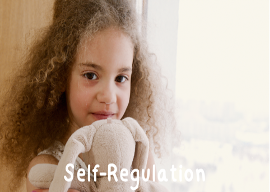
Self-regulation Facts
Self-regulation is a component of executive functioning. It is the ability to understand and manage your feelings, behaviors and reactions. It requires understanding your body, yourself, socially appropriate behavior and how to calm yourself. It impacts your ability to control your impulses, attend to a task, regulate your emotions, work through frustrating situations and social conflict.
Dysregulation naturally happens as children grow and develop. Age, sleep, illness, changes to routine can affect your child’s ability to regulate their emotions and behaviors. Some children are great at regulating at school or other public events but have a much harder time at home. To some degree these are all normal and typical problems with self-regulation, but if you are worried about your child’s behavior we encourage speaking with a professional.
Signs you should seek out help:
- increasingly more difficult behaviors as they get older
- tantrums that last a long time and it takes them a while to come out it even with help from an adult
- behaviors that are dangerous for themselves or others
- decreased communication and social skills compared to children of the same age
- withdrawn and has trouble interacting and engaging with others
- difficult to discipline and your strategies for encouraging positive behavior don’t seem to be working
Typical Self-Regulation Development
2-4 Years
Children in this age range are beginning to
- Understand the concept of time and waiting
- Clean up with assistance
- Understand patterns, categories and can sort by function, form and class
- Label own and other’s emotions (simple- sad, happy, mad ie) and can connect with simple behaviors
- Start and complete tasks that are 10 minutes long
- Display safety related behaviors
5-12 Years
Children in this age range are beginning to
- Understand time management skills, understand length of time tasks will take to complete and develop time estimation
- Clean up with some to no assistance
- Can gather materials for familiar tasks without help
- Control tantrums with decreasing levels of assistance
- Reflect on own behavior, identify and define problems to social and academic issues
- Follow safety rules and society norms without presence of adult
- Collect information and apply to new setting
- Start and complete tasks about 30 to 60 minutes long
- Follow checklist or schedule
- Have emerging problem solving skills